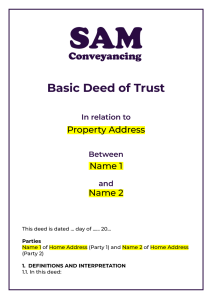Should I Buy a House with My Partner?
The decision to buy a house with your partner is more than just a financial one; it is a major life commitment. If you are both ready to make a significant long-term investment, you must have some hard conversations about your intentions for the property and how you would handle a break-up.
While it is a great way to get on the property ladder and build a future together, you must prepare for all possible outcomes and declare your intentions in a deed. This means having an open and honest discussion about your finances and receiving sound legal advice.
We recommend a floating deed of trust for most unmarried couples buying property together, but our team are on hand to discuss the best option for your personal circumstances.
Choosing your legal ownership
Once you've decided to buy a property together, you'll need to choose how you want to own it legally. In England and Wales, couples typically choose between being Joint Tenants or Tenants in Common.
This decision is crucial, as it has implications for what happens to the property if you or your partner dies, or if you ever split up.
Joint Tenants
As Joint Tenants, you and your partner own the property as a single, indivisible entity. There are no separate shares.
The key implication of this ownership is the right of survivorship: if one of you dies, their share automatically passes to the surviving partner. This happens regardless of what is stated in a will, which is a major point for couples to consider.
Tenants in Common
As Tenants in Common, you each own a distinct, separate share of the property. This can be equal (50/50) or unequal, which is why it's a common choice for partners who contribute different amounts to the deposit.
The key implication is that your share does not automatically pass to your partner if you die. Instead, you are free to leave your share to anyone you choose in your will. This type of ownership is also required if you wish to draft a Deed of Trust.
Does a joint mortgage have to be 50/50?
No. When you get a joint mortgage, you are both equally and jointly liable for the full debt, even if your ownership of the property is unequal (as Tenants in Common).
This means the lender can pursue both of you for the entire mortgage if payments are not made, regardless of who contributed what to the deposit or payments.
With a floating deed of trust, you are protected by ownership shares which adjust when one owner is covering more than their fair share of the mortgage or other agreed-upon payments.
Getting a Deed of Trust as Tenants in Common
A Deed of Trust is a legally binding document that sets out each owner's financial interest in the property. It provides protection and clarity, especially when you are not contributing equally to the purchase price.
It can only be used if you own the property as Tenants in Common. It is a common choice for partners who have paid different amounts towards the deposit, or if one partner has received a financial gift from family.
It outlines what percentage of the property each partner owns and how the proceeds would be divided if you were to break up or sell the property. A floating deed includes a formula which adjusts your shares according to the ongoing contributions you make throughout your ownership of the property.
It is the only way to legally protect unequal contributions to a property and is a tool for avoiding future disputes.
Protect your interest in a property and confirm how to sell. Drafted by a solicitor.
The first draft is within 1 to 2 working days* and includes:
- Deposit paid.
- The percentage ownership of each party.
- How to share expenses like the mortgage and bills.
- Share of property income - rent or gain on sale.
- How to sell the property.
- How the property is divided in the event of separation, divorce, or death.
The financial considerations of buying a house with your partner
When you buy a house with your partner, it's not just the legal side you need to get right. You'll also need to have an open conversation about the financial side of the purchase.
The Deposit
Couples often pool their savings to meet the required deposit. If one of you is contributing a significantly larger amount, you must have a Deed of Trust in place to legally protect that investment.
If a family member is gifting money for the deposit, your solicitor will need to verify that it is a gift and not a loan. Your deed of trust can specify that if you split up, you each get any deposit from your own parents back before the rest of the equity is shared out.
The Mortgage
Applying for a joint mortgage means the lender will assess both of your incomes and credit histories to determine how much you can borrow.
It's important to understand that you will both be jointly and severally liable for the mortgage. This means that if one of you fails to make the payments, the other is fully responsible for the entire debt.
A mortgage broker can help you find a suitable product and get the best rates for a joint application.
Stamp Duty
When you buy a property in England and Wales, you will need to pay Stamp Duty Land Tax (SDLT). The amount you pay is based on the purchase price of the property.
If you are both first-time buyers, you may be eligible for Stamp Duty relief, which could mean you pay less or no tax. Your conveyancing solicitor will calculate the correct amount for you as part of the legal process.
If one of you already owns a property and has a mortgage, adding a new partner to the title deeds is a process known as a transfer of equity.
This is handled by a conveyancing solicitor and requires consent from the mortgage lender. It's a key process for couples wanting to share legal ownership of a home that was previously in one person's name.
The conveyancing process for your joint purchase
While your solicitor handles the work, it helps to understand the main stages. The process for a couple is mostly the same as for a single buyer, but a solicitor ensures you are both legally and financially protected from the very start.
- 1
Offer Accepted and Solicitor Instruction
The process officially begins after the seller has accepted your offer. You and your partner will hire a conveyancing solicitor who will act on your behalf. They will start the legal work immediately. You must make a joint mortgage application; the lender will arrange a valuation.
- 2
Solicitor Work Begins
Your solicitor will perform all the necessary legal checks on the property, including searches and reviewing the title deeds.
This is also when they will advise you on the legal ownership options of Joint Tenants versus Tenants in Common and will prepare a Deed of Trust if you need one.
- 3
Formal Mortgage Offer
Once your solicitor and your mortgage lender are both satisfied, you will receive a formal mortgage offer.
- 4
Exchange of Contracts
This is the point of no return. You will sign and exchange contracts with the seller, and the purchase becomes legally binding. Although not legally required for conveyancing, we recommend a RICS survey to check for any problems with the property before you exchange.
- 5
Completion
This is the final day. The money is transferred, the property is legally registered in your name, and you get the keys.
- Fixed, competitive legal fees with no hidden costs.
- Expert conveyancing solicitors with proven local knowledge.
- No Sale, No Fee protection for your transaction. Terms apply.
- On 99% of mortgage lender panels.
- Fast completions.
- We can solve any property challenge.
Jack is our resident Content Writer with a wealth of experience in Marketing, Content, and Film. If you need anything written or proof-read at a rapid speed and high quality, he's your guy.
Caragh is an excellent writer and copy editor of books, news articles and editorials. She has written extensively for SAM for a variety of conveyancing, survey, property law and mortgage-related articles.











